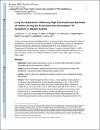Long Sun-Exposures Influencing High Sub-Cutaneous Synthesis of Vitamin-D3 may be Associated with Exacerbation of Symptoms in Allergic-Asthma.
| Author | D'Cruz, L G |
| Author | Husain, S A |
| Author | Wells, T |
| Author | Morgan, C |
| Author | Stanczyk, P J |
| Author | Satgunarajah, A |
| Author | Kashir, J |
| Author | Calver, B L |
| Author | Blayney, L M |
| Author | Lai, F A |
| Available date | 2023-09-13T10:11:38Z |
| Publication Date | 2018-03-26 |
| Publication Name | The Journal of aging research and clinical practice |
| Identifier | http://dx.doi.org/10.14283/jarcp.2018.10 |
| Citation | D'Cruz, L. G., Husain, S. A., Wells, T., Morgan, C., Stanczyk, P. J., Satgunarajah, A., ... & Lai, F. A. (2018). Long sun-exposures influencing high sub-cutaneous synthesis of vitamin-D3 may be associated with exacerbation of symptoms in allergic-asthma. The journal of aging research & clinical practice, 7, 47. |
| ISSN | 2258-8094 |
| Abstract | Does excessive sun-exposure, non-use of sunscreen and/or high doses of vitamin-D3 supplements provoke exacerbation of asthma? Clinical examinations, retrospective records-access and questionnaire surveys were distributed to a convenience sample of allergic-asthma patient (n=183). Patients (19-89 years) attending the outpatient respiratory clinics at Maidstone Hospital were enrolled. 90.3% of patients (total IgE levels ≥75 kU/L ; n=103) exposed to direct sunlight of ≥ 15 minutes per day continuously for 6-7 days presented with wheeze (χ2(1) = 7.46; p< 0.05) compared to only 9.7% patients of similar atopy-status, presenting with wheeze if exposed to sunlight of < 15 minutes per day for 6-7 days. 68.9% patients (with IgE levels ≥ 75 kU/L ; n=103), non-users of sunscreen (SPF 30 and above), exposed to direct sunlight of ≥ 15 minutes per day continuously for 6-7 days developed a wheeze, compared to fewer users of sunscreen (9.7%, n=103), exposed to the same duration of sunlight who developed asthma symptoms (p< 0.05). Vitamin-D3 supplementation in asthma-patients with clinical signs of hypovitaminosis-D (n=21), produced symptoms of morning chest-tightness (76.2%), allergic rhinitis (61.9%) and wheeze (100%), 2 weeks after initiation of treatment. Our results advocate direct sunlight exposure < 15 minutes per day and use of sunscreen as a novel approach to preventing atopic-asthma symptoms in allergic-asthma patients.. Activated vitamin-D3 is well-recognised to shift the immune-balance towards Th2 predominance, favouring allergic asthma. These results suggest that limiting subcutaneous synthesis of vitamin-D3 in asthma patients and re-addressing dosage of vitamin-D3 supplementation is necessary may contribute to prevent exacerbation of symptoms. |
| Language | en |
| Subject | Th1/Th2 Vitamin D asthma atopy sunlight |
| Type | Article |
| Volume Number | 7 |
| ESSN | 2273-421X |
Files in this item
This item appears in the following Collection(s)
-
Medicine Research [1913 items ]


